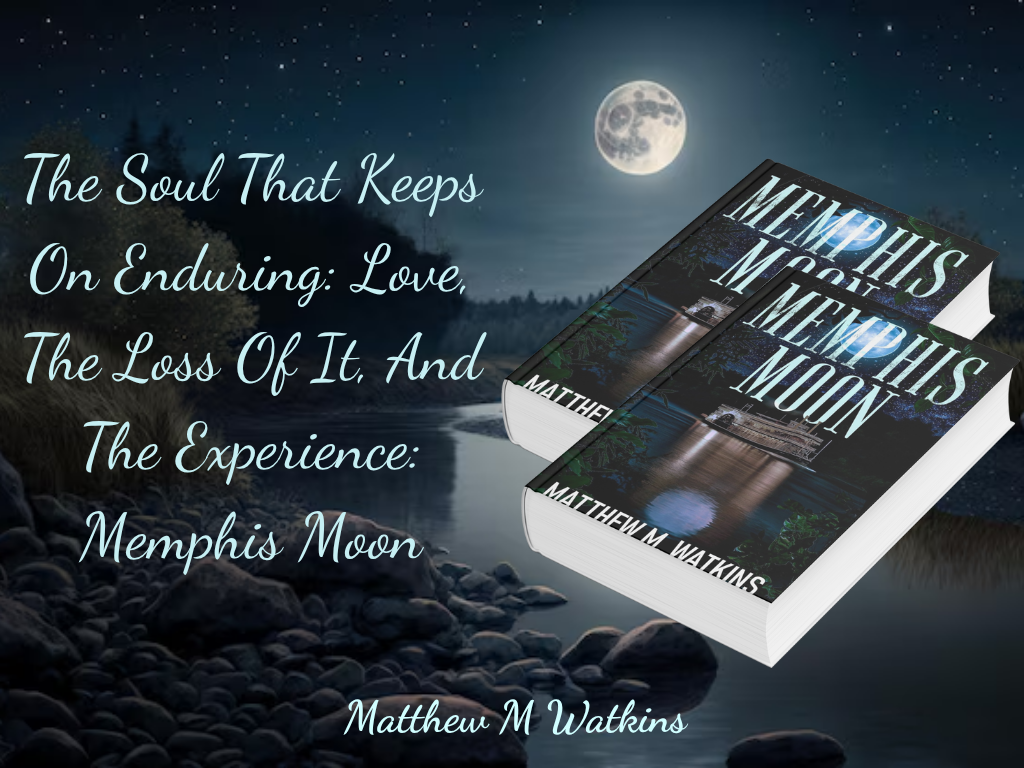There comes a time in every reader’s life when they come towards a story that not only entertains them intellectually but also tugs at their heartstrings, a story so rich and wonderful and emotional in depth that it reminds the reader what it means actually to be alive. Memphis Moon by Matthew M. Watkins is one of those rare novels, a sweeping tale of love and endurance set against the rumble of the Civil War, yet written with a pulse that feels unmistakably human.
The book begins not with soldiers or smoke, but with silence, the silence of a house being torn open in Greenwich Village, where a young writer stumbles upon a diary sealed behind the wall. Bound with a faded pink ribbon, the diary becomes a portal to another time, another heartbeat. Inside its pages lives Virginia “Ginnie” Bethel Moon, a real woman from the 19th century whose courage and compassion once shook the conventions of the South.
Through Ginnie’s words, the reader is transported back to Danville, Virginia, 1856. There, life hums through the turning wheel of a family gristmill, the laughter of townsfolk, the scent of magnolia after a storm, and then, suddenly, tragedy. Caleb Dawkins, the miller’s son, loses his father in a supposed accident, and with that loss, his world fractures. What follows is not just a quest for justice, but a journey toward forgiveness, and a rediscovery of what it means to rebuild when everything familiar is gone.
Watkins doesn’t rush his storytelling. He lingers where it matters, in the ache of Caleb’s mourning, in the quiet defiance of Ginnie’s gaze, in the murmur of small-town church hymns and the rustle of magnolia leaves at dusk. Every detail breathes; every emotion feels earned. Readers aren’t simply watching history unfold; they’re standing in it, hearts open, hands trembling at the weight of what love and loss can do to a soul.
At its core, Memphis Moon is a conversation between two centuries: the world Ginnie lived in, and the one the modern writer inhabits. The diary bridges them, binding their hearts across time. Watkins reminds us that grief and hope do not belong to the past alone; they live in every one of us, waiting to be awakened by the right story.
What makes this novel so affecting is how deeply it understands the dual nature of the human heart. Caleb’s grief becomes his forge. Instead of succumbing to bitterness, he builds anew, in faith, in work, in the stubborn belief that love outlasts loss. His relationship with Ginnie, tender yet fierce, shows that the truest connections are those that withstand the world’s storms rather than avoid them.
And then there are the women, Ginnie and her sister Lottie Moon, two figures drawn from real history, reborn in fiction with the richness and contradiction that real life deserves. Watkins doesn’t paint them as flawless heroines; he gives them doubts, flaws, and daring. Ginnie, the Confederate spy who hides messages in her curls and courage in her smile, becomes a mirror for every woman who has ever had to find her own strength in a world that doubted her. Lottie, the missionary and educator, carries another kind of bravery, quiet, spiritual, and steadfast. Together, they form the emotional spine of Memphis Moon, proof that history’s greatest acts of courage often happen in the shadows, not the spotlight.
The novel’s Civil War backdrop is rendered with honesty, not sentimentality. Watkins neither glorifies nor condemns; he lets the landscape speak, the millponds gone still, the fields turned red with clay and blood, the fragile threads of family and faith strained by a nation’s reckoning. Through Caleb’s eyes, readers witness the South’s transformation, its painful shedding of old skin, and the birth of something new.
Yet amid all the ruin, Memphis Moon insists on hope. By the time the young writer in modern New York sets down the rediscovered diary, readers have walked two journeys: one through the blood and dust of the past, and one through their own capacity for empathy. That’s the magic of Memphis Moon; it’s not just historical fiction, it’s emotional archaeology. It digs through time to show us what endures when everything else fades.
The Author Matthew M. Watkins writes like someone who has a childlike belief in the awesome power of stories and how they help redeem whoever goes through them. That is truly the greatest message he can give to his readers through his novel. Beneath the layers of history, beyond the heartbreaks and betrayals, there’s a single truth pulsing through: to love, to lose, and to rise again is what makes us human.

